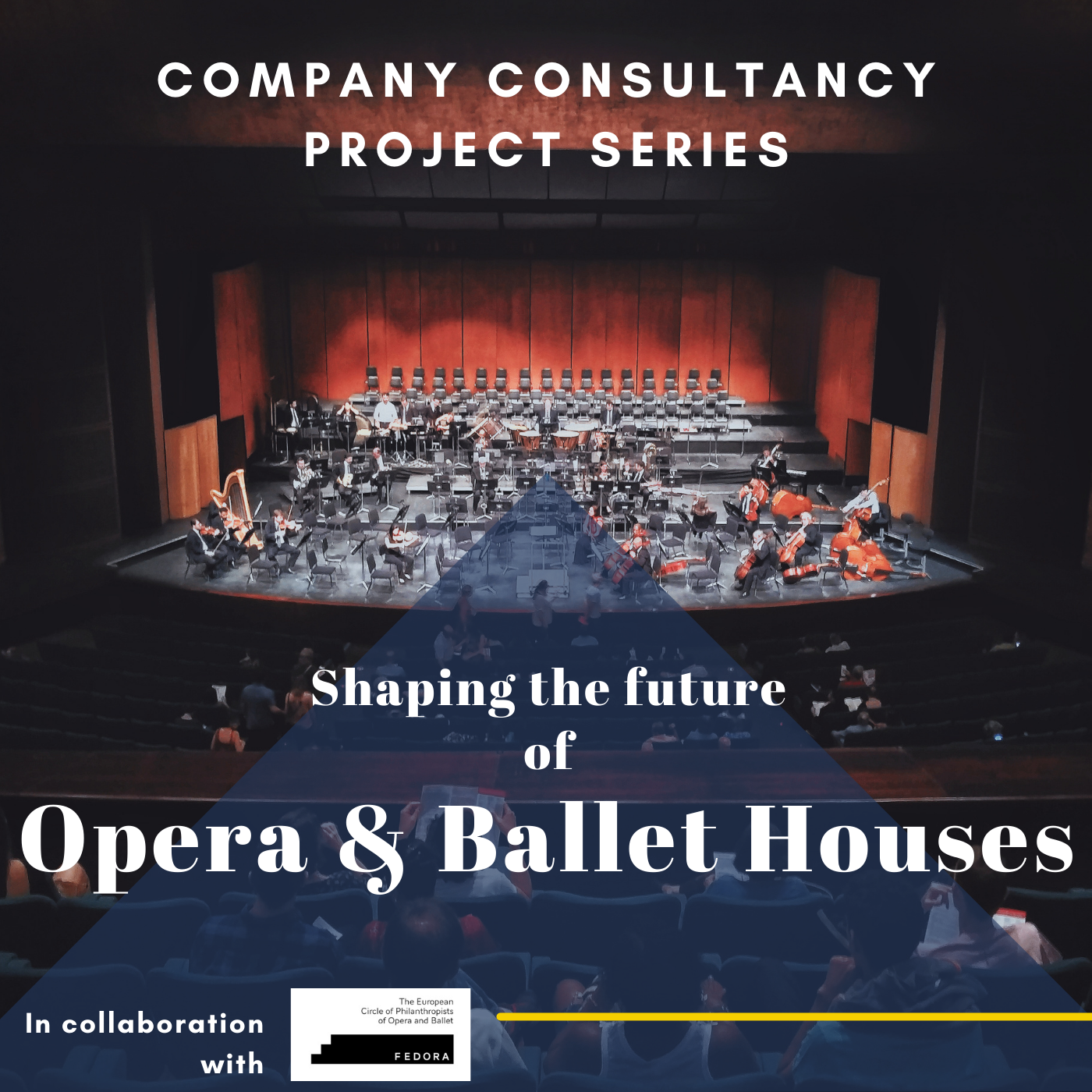Fedora x ESCP: Collaborating Today To Deliver The Next Steps For The Performing Arts Tomorrow

By Caroline Moser | Jongeun Lee | Maria Claudia Aguilar | Marouane Saidi | Valerie Alia
As MSc in Marketing & Creativity students, the Company Consultancy Project represents for us an opportunity to get in touch with the real world. Some of us had more work experience than others, but we were still excited about with which company we would get the chance to collaborate.
Our surprise was huge when we were assigned to the Parisian organisation FEDORA – The European Circle of Philanthropists of Opera and Ballet. We were delighted to be given the opportunity to work for the performing arts sector, in one of the most artsy cities in the world.
We all started this journey on the same page: none of us had experience in the performing arts or culture sector specifically, however we were equally excited to take on the challenge as consultants, guided by our expert tutor Aurélie Benoit-Gonin.
-
The industry context
Opera and ballet have been important cultural contributions to society for centuries. First emerging in Italy, opera quickly became popular throughout Europe, with Paris, London and Vienna representing the major centres of this art form. Even though historic and political changes happened, the opera remained ageless and an artistic reflection of society, constituting an anchor-like aspect for art enthusiasts. The performing arts sector might be a place for social interaction, but it is much more than that: a performance that reflects emotions, society and human nature, also considered to be a strong driver and advocator of European cultural heritage.
Worldwide, more than 20,000 performances at 808 opera houses and festivals take place every year. More than half of these cultural institutions are located solely in Europe, making it the most important continent for the performing arts sector. During troublesome years such as 2020, the performing arts represent a way to forget what is going on around us and deliver powerful and exciting emotions.
-
The Problem
Even though all of this sounds prosperous, the future of opera and ballet houses is questionable. According to a study made by Deloitte in October 2013, Opera, a European Worth, only 2% of European citizens have attended an opera or ballet performance over the past five years. The average visitor is a 54-year-old white female with a higher education level. Additionally, most of the works played in operas houses were written by the same 10 composers.
The art forms of opera and ballet have often been perceived as exclusive and inaccessible. Cultural organisations must therefore work on opening up their institutions and bringing down barriers on, behind and beyond the stage to be as socially inclusive as possible and remain relevant.
The COVID-19 pandemic has added another layer to this problem. The performing arts sector has been heavily affected, and the situation requires rapid transformation to make this sector more resilient and sustainable. According to a survey that was conducted by FEDORA’s expert partner, Opera Europa, the pandemic has caused astronomical loss with critical productivity issues; around 40% of scheduled performances for the 2019/2020 season were cancelled. As a result of these massive cancellations and theatre closures, one-third of the total budget has been lost and, thus, people in the industry have lost their jobs.
Through a deep reflection of the status quo, FEDORA – together with Opera Europa and Creative Europe, the cultural funding programme of the European Union – have identified the three most problematic areas to be tackled by the performing arts sector: sustainability, equality, and digital transformation. These three initiatives will allow opera and ballet institutions to transform themselves and better adapt to new realities after the pandemic, while also improving their access to funding opportunities and quality resources, including best-practice sharing and industry expertise.
-
Meet FEDORA
FEDORA – The European Circle of Philanthropists of Opera and Ballet is the leading non-profit organisation in Europe in transforming the performing arts sector through fundraising. Its mission is to support the renewal of opera and ballet by reaching out to a wider audience as well as providing visibility and funding to innovative projects with emerging artists.
To achieve this, FEDORA created four prizes that are awarded to innovative projects that focus on important topics such as social inclusion, intercultural dialogue, cross-border collaboration and digitalisation. Through these prizes, innovation and creativity are reaching theatre and opera house stages. Since 2014, the organisation has supported 18 projects by emerging artists, attended by more than 500,000 people around the world, with just €1.5 million in funding.
Now, the organisation is taking the next step in reinventing the performing arts sector. FEDORA is planning to introduce a multi-year business plan, which focuses on three initiatives to achieve an innovative transformation in opera and ballet companies and focus on the key aims of sustainability, equality, and digital transformation.
-
Key Takeaways
As a student team, we were humbled by the opportunity to contribute through our research to the preparation of this new initiative under the leadership of the FEDORA team. As we were given the challenge to contribute to the development of the business plan and pitching tools, our own diverse and international backgrounds allowed us to share valuable perspectives on the project.
We were able to draw from our knowledge of several industries and apply them to related business scenarios in the performing arts sectors, specifically in opera, ballet and festivals. Moreover, as we performed a situational analysis for the project, we were able to understand the importance of the work of FEDORA towards ensuring the future of the performing arts sector. As the need for change and audience rejuvenation is essential, there are very few other network organisations focused on this mission around the world. This makes FEDORA’s work even more vital, as the organisation must receive all the support they can get to achieve their important goals. On the other hand, something important to highlight is that since this project will be a global pioneer in its sector, the communication and marketing opportunities will be major.
Finally, as we are experiencing one of the worst pandemics in our history where everything is changing from one day to another, we were able to witness the importance and strength of community building within the performing arts sector. We were inspired by all the immediate initiatives taken on by several houses and performers around the world to keep the industry moving as the stages closed indefinitely.
The passion and drive are truly what power this industry, even despite COVID-19’s impact on the lives of performers, creatives and managers. Nonetheless, after collaborating with FEDORA, we are sure that they are one of the institutions that will help provide that light at the end of the tunnel.
Thanks to what FEDORA is doing today, there is a bright future for the performing arts.





